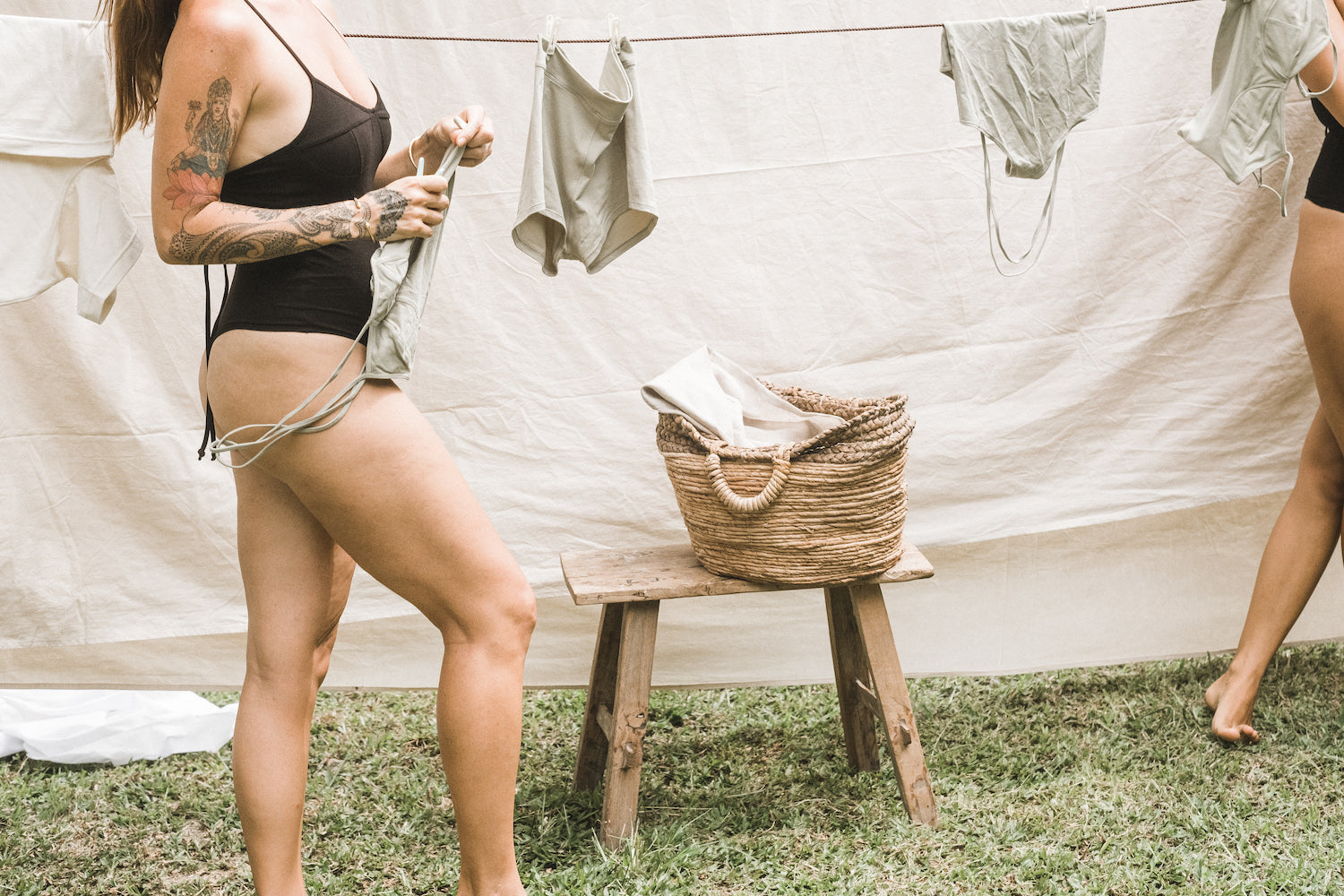
TLC-Series: How to wash your Studio K garments
Every cent spent on a product casts a vote for the kind of world we want to live in. To be sustainable is more than just simply a product. It is a way of living with intention, accountability and commitment, a voice to be used and heard and a choice to be made in favour of our planet and mankind.
Our brand has been created in accordance, alignment and approval with nature, her cycles and our love for our planet. Our desire and mission is to create in harmony with nature and all the life that she holds.
25% of the carbon footprint of a garment comes from the way we care for it. On top of that, 90% of our clothing is thrown away long before it needs to be, due to our culture of ‘fast fashion’ and outdated laundry habits.
If a piece is worn out, has lost its shape, shows flaws, stains and holes or have lost their color and buttons – replacement is the easy way out and way more exciting, too.
We care about sustainable garment care. While step 1 begins with choosing high quality, sustainably made clothing, step 2 means to learn how to make it last by learning how to care for them better.
We support you in your commitment to a sustainable way of living - hence we created the TLC series (TLC = ‘tender loving care’) for you to take better care of your precious wardrobe.
Sustainable garment care to us means…
- To shop considerately: quality over quantity
- To not over-wash: which means to wash less
- To love every inch of your clothes and treat them with love and care
- To mend what is broken and give it another chance
- To give clothes a second life by donating, swapping with friends or use it for DIY projects.

How to wash your Studio K garments
We want your Studio K garments to last a lifetime. Because to us quality stands over mindless, limitless consumption. It means a lot to us to inspire consumers to wash their clothes less, to avoid the harsh and damaging dry cleaning process and to use lower washing temperatures.
If washed and cared for properly AND sustainably our pieces will have a long and happy life.
Well made clothing is an investment and this is how we do it:
- Wash carefully with similar colors.
- Use eco-friendly detergent (no phthalates, no phosphates, no non-biodegradable surfactants as these products generally break down the elasticity in textiles over time
- Use a washing bag. A good investment is Guppyfriend.
- Machine wash at max 30 or 40 degrees
- No bleach, no tumble dry
- Iron at the lowest heat or steam item
Special care instructions for some of our materials:
ECONYL®
ECONYL® is a nylon fabric made from abandoned fishing nets. By using ECONYL® we lessen our negative impact through cleaning up waterways and repurposing trash.
However, the downside of ECONYL® are microfibres. An issue that has come up in the past years is that tiny plastic particles are released from synthetic fibres during washing and can land in the waterways no matter what. While we embrace the ability to reduce waste in our oceans, we still need to be aware that ECONYL® can find its way back as microparticles, hence we need to come to understand how to minimise them when using recycled plastic fabric.
Ways to tackle this issue are:
- To question the garments really need to be washed or if airing out will do for now,
- To use a special wash bag like Guppyfriend for your garments
- To use a filter in your washing machine (make sure to properly recycle the residue),
- To only buy goods that don’t require regular washing like shoes and swimwear.
The recycled ocean waste material protects from harmful UV rays and can be used for swimming.
We recommend rinsing it in fresh water directly after use in chlorinated pools or salty bodies of water.
Bamboo
Bamboo fabrics will maintain their special qualities when washed in cold to warm water (maximum up to 40 degrees Celsius) with a gentle detergent, generally free of bleach.
A gentle wash cycle helps the material maintain its suppleness and softness. Hot water should generally be reserved for regular washing only, as it can cause the bamboo fabric to shrink.
Clothes and linens made from woven bamboo fabrics should ideally be air-dried flat on an indoor folding rack or hung from an outdoor clothesline for best results.
If ironing is necessary, rather use a dry iron (no steam) at a low setting. Extremely high temperatures when ironing can scorch bamboo fibers and the quality deteriorates.
Stay hydrated and tuned for more...









